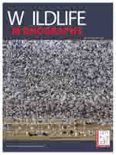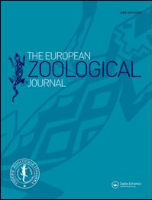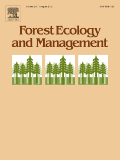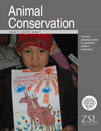
California Fish and Wildlife Journal
metrics 2024
Illuminating Paths to Effective Wildlife Management
Introduction
California Fish and Wildlife Journal, published by the California Department of Fish and Wildlife, is a pivotal platform dedicated to advancing the understanding of fish and wildlife management and conservation. As an open access journal, it fosters collaboration and knowledge sharing among researchers, practitioners, and students interested in aquatic and terrestrial ecosystems. With a focus on empirical research, policy implications, and innovative conservation strategies, the journal plays a crucial role in informing both scientific communities and decision-makers alike. Researchers seeking to contribute to critical discussions on sustainability, habitat preservation, and biodiversity will find this journal an essential resource. The journal’s commitment to disseminating knowledge about California's rich natural resources enhances its stature in the field of wildlife management and conservation studies.
Metrics 2024
 -
- 1.00
1.00 -
- -
-Metrics History
Rank 2024
IF (Web Of Science)
JCI (Web Of Science)
Quartile History
Similar Journals

WILDLIFE MONOGRAPHS
Championing impactful research in wildlife conservation.WILDLIFE MONOGRAPHS, published by WILEY, is a prestigious journal dedicated to advancing the understanding of ecological and biological sciences with a keen focus on wildlife conservation and management. With an ISSN of 0084-0173 and an E-ISSN of 1938-5455, this journal has established itself as a leader in its field, ranking in the Q1 quartile for both Ecology, Evolution, Behavior and Systematics and Nature and Landscape Conservation in 2023. The journal's remarkable impact is underscored by its Scopus rankings—46th out of 721 in Agricultural and Biological Sciences and 17th out of 211 in Environmental Science, highlighting the journal's influential role in shaping research discussions and policy in wildlife management. Available in print and online, WILDLIFE MONOGRAPHS publishes comprehensive studies that inform practitioners, researchers, and students alike, fostering a deeper insight into biodiversity and ecosystem dynamics. Founded in 1981, the journal continues to evolve, contributing significantly to the scientific community through rigorous peer-reviewed articles that bridge the gap between theory and practical application in wildlife management.

Journal of Zoo and Aquarium Research
Advancing conservation through innovative research.Journal of Zoo and Aquarium Research is an esteemed publication dedicated to advancing the field of zoology and aquatic sciences. Published by the European Association of Zoos & Aquaria (EAZA), this journal provides a dynamic platform for sharing groundbreaking research, best practices, and conservation efforts within zoos and aquariums, making it an invaluable resource for researchers, professionals, and students alike. With an increasing focus on the importance of biodiversity and sustainable practices, the journal is committed to fostering scholarly communication that enhances the understanding of animal care, species conservation, and habitat preservation. Although specific metrics such as impact factor and HIndex are currently unavailable, the journal's rigorous peer-review process ensures that only high-quality research is disseminated. As an open-access publication, the Journal of Zoo and Aquarium Research promotes accessibility to vital information, encouraging a broader engagement with critical issues in wildlife conservation. By addressing contemporary challenges in the field, this journal stands as a pivotal resource for those dedicated to promoting animal welfare and ecological sustainability.

European Zoological Journal
Exploring the Wonders of ZoologyEuropean Zoological Journal, published by Taylor & Francis Ltd, is an esteemed open-access publication dedicated to advancing the exciting field of zoology. Since its inception in 2017, this journal has progressively established itself as a vital resource for researchers, professionals, and students alike. With its Q2 ranking in Animal Science and Zoology as of 2023, the journal ranks in the 69th percentile among its peers, showcasing its influence and contribution to the discipline. The journal’s broad scope covers a wide range of topics within zoology, aiming to foster an understanding of animal biology and conservation efforts. As an open-access journal, it not only enhances the dissemination of knowledge but also encourages collaborative research across global communities. Situated in the United Kingdom, the European Zoological Journal invites submissions that contribute to the evolving discourse in animal sciences, and endeavors to support the scientific community in addressing pressing ecological challenges.

GULF AND CARIBBEAN RESEARCH
Fostering Interdisciplinary Dialogue on Water ScienceGulf and Caribbean Research is an esteemed academic journal published by the University of Southern Mississippi, dedicated to advancing the understanding of aquatic ecosystems in the Gulf of Mexico and the Caribbean region. With an ISSN of 1528-0470 and an E-ISSN of 2572-1410, the journal serves as an essential platform for researchers and professionals in the fields of Aquatic Science, Oceanography, and Water Science and Technology, recognized in the 2023 Q3 Quartile rankings across these disciplines. The journal welcomes diverse contributions including original research, reviews, and technical notes, encouraging interdisciplinary approaches to address ecological and environmental challenges within its scope. Despite the absence of an open access option, it provides invaluable insights, evidenced by its Scopus rankings, which position it within the 31st to 33rd percentile across various related categories. The engaging research articulated in Gulf and Caribbean Research fosters dialogue and collaboration, making it a vital resource for those committed to scientific discovery and conservation efforts in these critical aquatic environments.

ORNIS FENNICA
Elevating the Study of Birds through Innovative ResearchORNIS FENNICA, published by BirdLife Finland, is a seminal journal dedicated to the field of ornithology and avian ecology. Established in Finland, this journal has been a vital resource for researchers, professionals, and students since its inception, evolving through converged publication periods from 1979 to 1985 and again from 1991 to the present. ORNIS FENNICA holds a Q2 category ranking in Animal Science and Zoology for 2023, indicating its significant influence and reputation within the academic community, as reflected in its Scopus ranking of 242 out of 490 in its field. The journal aims to promote the study of birds, encompassing aspects such as behavior, conservation, and biodiversity, thus serving as a crucial platform for disseminating innovative research findings. Although it is not open access, ORNIS FENNICA remains committed to advancing ornithological knowledge and supporting the scientific community's efforts to understand and protect avian species. For those invested in the nuances of bird research, this journal offers an invaluable repository of scholarly articles, reviews, and insights.

FOREST ECOLOGY AND MANAGEMENT
Transforming Insights into Action for Forest HealthFOREST ECOLOGY AND MANAGEMENT is a premier peer-reviewed journal dedicated to the integral study of forest ecosystems and their management, published by Elsevier in the Netherlands. With an impactful presence in the field, this journal boasts a prestigious Q1 ranking in multiple categories, including Forestry, Management, Monitoring, Policy and Law, and Nature and Landscape Conservation as of 2023. It addresses key issues relevant to sustainable forest practices, conservation strategies, and environmental monitoring, making it a vital resource for researchers, practitioners, and policymakers alike. The journal is indexed with an impressive Scopus rank, placing it among the top tier of titles in Agricultural and Biological Sciences and Environmental Science. While it does not offer Open Access options, its rigorous review process and high visibility make it essential for those seeking to stay abreast of the latest findings and trends in forest ecology and management. Published continuously since 1976, FOREST ECOLOGY AND MANAGEMENT aims to foster interdisciplinary collaboration and advance knowledge critical to the stewardship of forest resources in an ever-changing global landscape.

JOURNAL OF WILDLIFE MANAGEMENT
Transforming knowledge into action for wildlife preservation.Welcome to the Journal of Wildlife Management, a premier publication dedicated to advancing the science and practice of wildlife management. Published by Wiley, this journal spans decades of impactful research and has been a cornerstone in the fields of Ecology, Evolution, Behavior, and Nature and Landscape Conservation. With an impressive ranking in the Q1 quartile across multiple disciplines, it provides a crucial platform for interdisciplinary collaboration and dissemination of knowledge among researchers, practitioners, and policy-makers. Covering a wide range of topics pertinent to wildlife management, this journal promotes innovative techniques and sustainable practices that are essential in addressing contemporary ecological challenges. The Journal of Wildlife Management is rigorously peer-reviewed, ensuring high standards of quality and relevance, making it an invaluable resource for those committed to conservation and ecological research.

CALIFORNIA FISH AND GAME
Bridging Research and Conservation for WildlifeCalifornia Fish and Game is a prominent journal dedicated to the fields of Animal Science and Aquatic Science, published by the California Fish and Game Editor. With its roots extending back to 1979, the journal has served as a vital platform for disseminating research focused on the wildlife and aquatic ecosystems of California and beyond. Recognized within the Q4 quartile for both Animal Science and Zoology and Aquatic Science, it provides critical insights and scholarly contributions, despite its comparative rankings within the respective categories. The journal, with an ISSN of 0008-1078 and an E-ISSN of 2331-0405, offers an invaluable resource for researchers, professionals, and students alike, looking to deepen their understanding of California's rich biodiversity and ecological challenges. For those interested in open access options, further details can be reviewed through the journal's platform. By fostering a community of inquiry, California Fish and Game plays an essential role in advancing knowledge and conservation efforts in the fields of interest.

ANIMAL CONSERVATION
Uniting Voices for Global Conservation Efforts.Animal Conservation is a prestigious journal that serves as a vital platform for the dissemination of research dedicated to the preservation of wildlife and habitats. Published by Wiley, this journal has established a significant presence in the fields of Ecology and Nature and Landscape Conservation, holding a distinguished Q1 category ranking for both in 2023. With an impressive Scopus rank of #25 in the realm of environmental science, it caters to a global audience keen on understanding and addressing pressing conservation issues. The journal provides researchers, professionals, and students with high-quality, peer-reviewed articles that explore innovative methods and strategies in animal conservation. With its continuous publication since 1998, encompassing a comprehensive range of topics, Animal Conservation is indispensable for anyone aiming to make impactful contributions to the field of ecology and conservation biology.

EUROPEAN JOURNAL OF WILDLIFE RESEARCH
Bridging knowledge gaps in wildlife ecology and management.European Journal of Wildlife Research, published by SPRINGER, is a key academic resource in the fields of ecology, evolution, behavior, and systematics, as well as management, monitoring, policy, and law related to wildlife conservation. With an impressive Q2 categorization among its peers, this journal serves as a vital platform for interdisciplinary research, fostering dialogue among researchers, conservationists, and policymakers. The journal focuses on innovative studies that delve into wildlife ecology, population dynamics, and species management, contributing significantly to our understanding and preservation of biodiversity in various landscapes. Although its coverage in Scopus ended in 2003, the journal's heritage is deeply rooted in the field, dating back to its inception in 1955, and continues to influence contemporary research practices. As an open-access journal, it allows for broad dissemination of knowledge, ensuring that vital findings reach a global audience, making it a valuable reference for students, professionals, and academics committed to wildlife research.